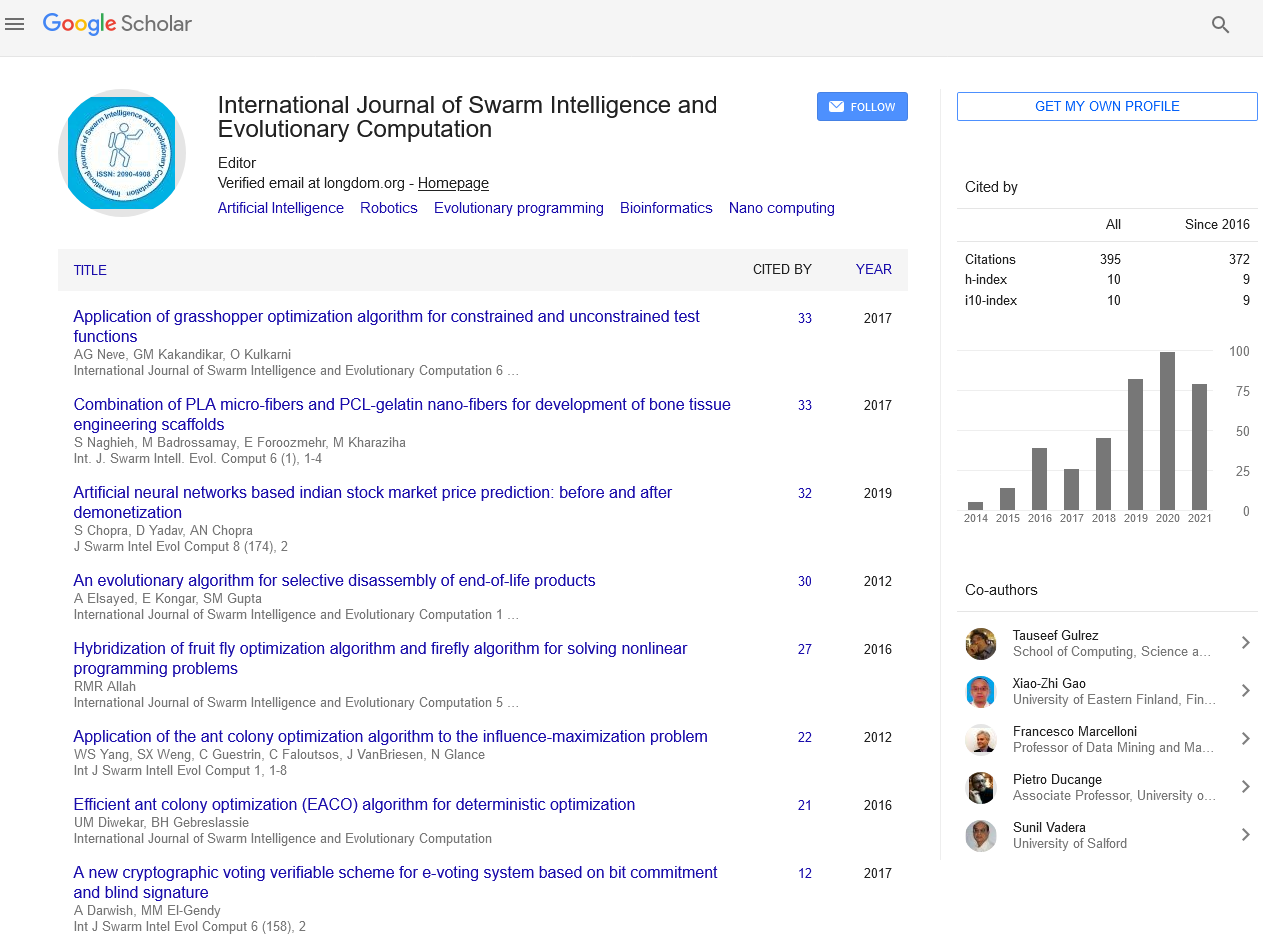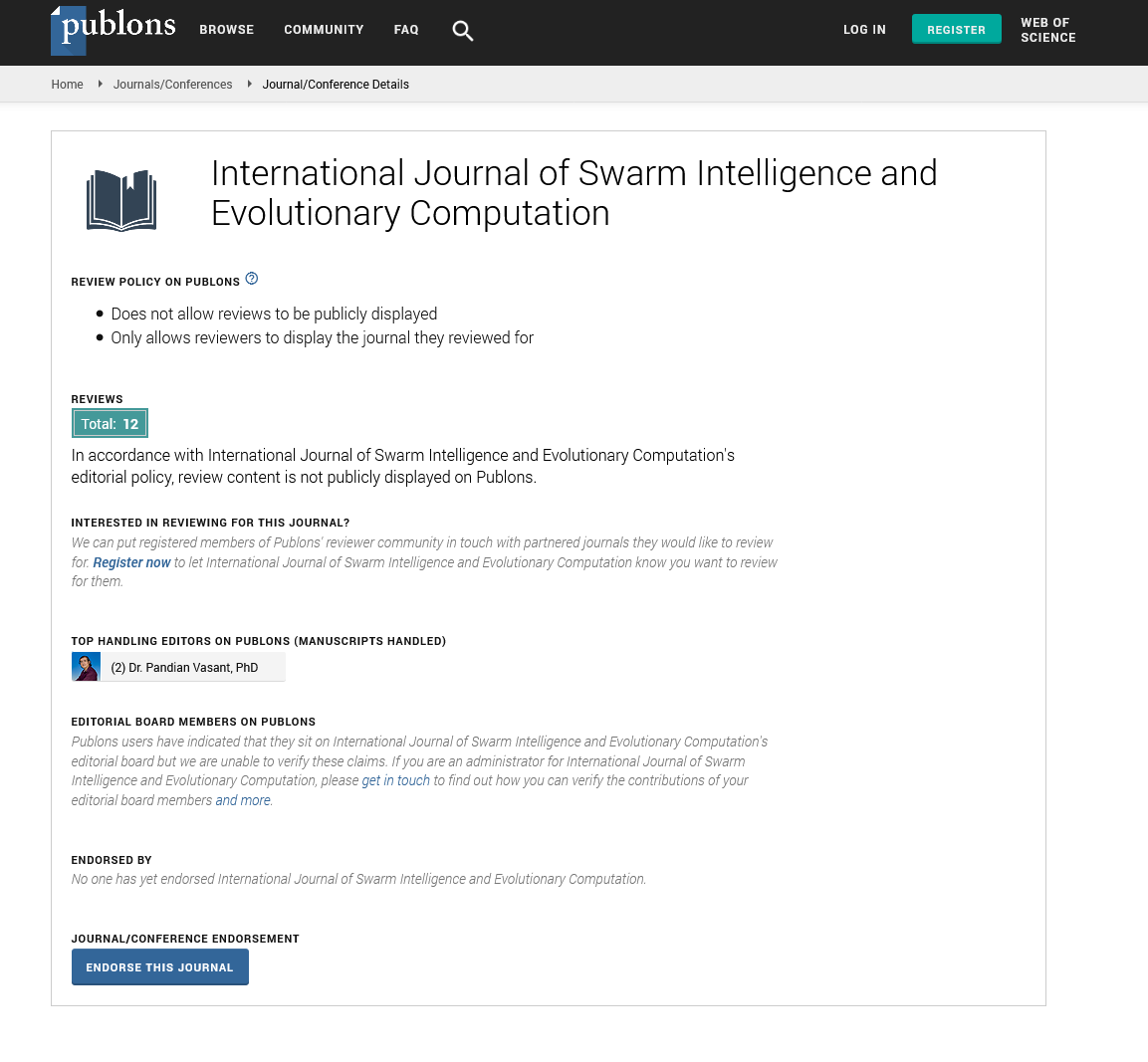Indexed In
- Genamics JournalSeek
- RefSeek
- Hamdard University
- EBSCO A-Z
- OCLC- WorldCat
- Publons
- Euro Pub
- Google Scholar
Useful Links
Share This Page
Journal Flyer

Open Access Journals
- Agri and Aquaculture
- Biochemistry
- Bioinformatics & Systems Biology
- Business & Management
- Chemistry
- Clinical Sciences
- Engineering
- Food & Nutrition
- General Science
- Genetics & Molecular Biology
- Immunology & Microbiology
- Medical Sciences
- Neuroscience & Psychology
- Nursing & Health Care
- Pharmaceutical Sciences
Perspective - (2023) Volume 12, Issue 3
Nature-Inspired Intelligence: Exploring the Synergy of Biological Systems and Artificial Intelligence
Kanring Chen*Received: 21-Apr-2023, Manuscript No. SIEC-23-21830; Editor assigned: 24-Apr-2023, Pre QC No. SIEC-23-21830 (PQ); Reviewed: 10-May-2023, QC No. SIEC-23-21830; Revised: 17-May-2023, Manuscript No. SIEC-23-21830 (R); Published: 25-May-2023, DOI: 10.35248/2090-4908.23.12.318
Description
Nature Machine Intelligence (NMI) is an emerging field that draws inspiration from natural systems to develop intelligent machines and algorithms. As the intersection of Artificial Intelligence (AI) and biology, NMI explores the principles, mechanisms, and strategies observed in nature to design more efficient, adaptive, and robust intelligent systems.
Foundations of nature machine intelligence
Biological inspiration: NMI seeks inspiration from biological systems, such as the human brain, neural networks, evolutionary processes, and natural behaviors. By understanding and mimicking the fundamental principles of biology, researchers aim to develop intelligent algorithms and machines that exhibit similar capabilities, such as learning, adaptation, and efficient decision-making.
Ethical considerations: As NMI advances, ethical considerations become increasingly important. Questions regarding data privacy, algorithmic bias, and the impact of intelligent machines on society must be carefully addressed. It is crucial to develop guidelines and regulations that ensure the responsible and ethical use of NMI technologies.
Cognitive science: Cognitive science plays a crucial role in NMI by providing insights into human cognition, perception, and reasoning processes. By studying how humans process information, make decisions, and solve complex problems, researchers can develop AI systems that mimic these cognitive abilities and enhance their performance.
Methodologies in nature machine intelligence
Neural networks: Neural networks, inspired by the structure and functioning of the brain, form a fundamental component of NMI. These networks consist of interconnected nodes (neurons) that process and transmit information. By training neural networks on large datasets, they can learn patterns, recognize objects, make predictions, and perform complex tasks.
Evolutionary computation: Evolutionary computation techniques, such as genetic algorithms, genetic programming, and swarm intelligence, draw inspiration from the principles of natural evolution. These techniques involve generating a population of solutions, evaluating their performance, and iteratively evolving them through selection, recombination, and mutation operations. Evolutionary computation is employed to optimize complex problems, design efficient algorithms, and explore solution spaces.
Applications of nature machine intelligence
Robotics and automation: NMI finds extensive applications in robotics and automation. By incorporating biological principles, such as sensory perception, motor control, and learning, researchers can develop robots that exhibit more natural and efficient behavior. NMI-based robots have the potential to perform complex tasks in unstructured environments, adapt to changing conditions, and interact effectively with humans.
Healthcare and medicine: NMI holds promise in revolutionizing healthcare and medicine. Intelligent algorithms inspired by biological systems can aid in disease diagnosis, personalized treatment recommendations, drug discovery, and medical image analysis.
Data analysis and prediction: NMI techniques excel in data analysis and prediction tasks. By leveraging neural networks and evolutionary computation, researchers can develop models capable of processing large datasets, detecting patterns, making accurate predictions, and extracting meaningful insights. NMIbased systems have applications in various fields, including finance, marketing, and weather forecasting.
Challenges and future directions
Ethical considerations: As NMI advances, ethical considerations become increasingly important. Questions regarding data privacy, algorithmic bias, and the impact of intelligent machines on society must be carefully addressed. It is crucial to develop guidelines and regulations that ensure the responsible and ethical use of NMI technologies.
Explainability and interpretability: As NMI systems become more complex, it becomes challenging to understand and interpret their decisions and behaviors. Researchers must focus on developing methods to enhance the explainability and interpretability of NMI algorithms, enabling users to understand how and why certain decisions are made.
Conclusion
Nature Machine Intelligence is an exciting and rapidly evolving field that merges the principles of biology and artificial intelligence. By harnessing the power of neural networks, evolutionary computation, and biological inspiration, NMI offers the potential to revolutionize robotics, healthcare, data analysis, and numerous other domains. As NMI continues to progress, it is essential to address ethical considerations and enhance the explainability of intelligent systems. With its interdisciplinary nature and transformative capabilities, NMI is poised to bridge the gap between nature and AI, unlocking new frontiers in intelligent machines and algorithms.
Citation: Chen K (2023) Nature-Inspired Intelligence: Exploring the Synergy of Biological Systems and Artificial Intelligence. Int J Swarm Evol Comput. 12:318.
Copyright: © 2023 Chen K. This is an open-access article distributed under the terms of the Creative Commons Attribution License, which permits unrestricted use, distribution, and reproduction in any medium, provided the original author and source are credited.


